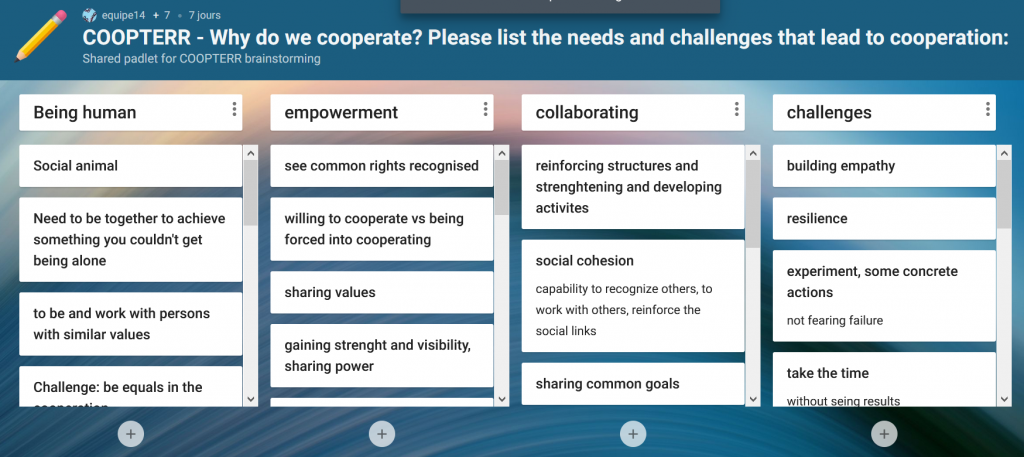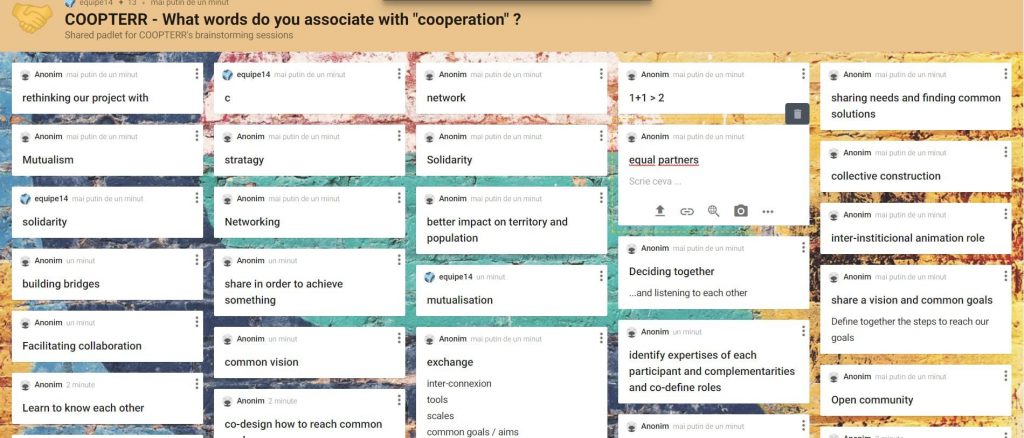By the COOPTER Communication group
On the first week of December 2020, six countries representant participated in our 1st Transnational Online Meeting, for 3 days. The meeting was hosted by our coordinator organisation UFISC, from Paris (France).
We are together with 6 European partners, from which 3 partners come from cities that will be the European capital of culture in future years. The partner organisations’ staff and their volunteers will be involved in training sessions and field visits, which will facilitate future territorial cooperation steps.

COOPTERR is a strategic partnership project (Key Action 2) with support of Erasmus Plus Programme for Adult Education. The project aims at developing training regarding territorial cooperation practices, in order to help professionals and volunteers of these organisations. Our approach associates cultural, social, economic and territorial dimensions. It brings together organisations that implement territorial cooperation through the mutualisation of means, collective events, shared-places, collaborative cultural projects or territorial networks regrouping social & solidarity economy organisations.

COOPTERR brings together six European partners, for 28 months, involved in civic, cultural and social life: CRIES (Romania), Fekete Sereg (Hungary), Largo (Portugal), Solidarius (Italy), RIPESS Europe (Luxembourg), UFISC (France). These non-profit organisations chose to share their experiences, practices and knowledge in territorial cooperation. They wish to foster networking between actors involved in territorial cooperation and disseminate their practices and methods. The assimilation of cooperation skills enables to develop a critical reflection on the world, on the professional organisation and reinforces civic implication altogether.
The partners co-constructed a programme consisting of six mobilities, four transnational meetings, and sessions of online collaboration, to share experiences within each partner country, meet local territorial actors and engage in theoretical and practical training. Each activity will be composed of 25 to 30 participants or more, on the occasions of public meetings and visits. Based on informal education methods, peer to peer and in real situation training, as well as shared knowledge among the participants, the programme aims at improving adults’ skills. It will strengthen relationships and networks among the people and within the partner organisations.
The various situations of cooperation will highlight the added values inherent to the respect of human rights and sustainable development, and greater inclusion and equality. A ‘fil rouge’ will emerge from experiences of cultural cooperation, lived through cultural events and festivals, and more particularly through the European Capitals of Culture framework, that several partners will experience. This theme will raise awareness of cultural diversity in Europe and on the necessary valorisation of cultural resources of people and European territories.

The project, focusing on the transformations experienced by territories and social practices, will work on common references and values and facilitate the understanding of the European context and its evolution. Aimed at people involved in the animation and transmission of methods of territorial cooperation, and at actors of cooperation, it will expand beyond to spread the culture of cooperation in Europe, through free, open dissemination of the project resources and results.
The expected impacts are to strengthen people’s capacities and skills, mutualisation, collective governance, shared-places, collective and territorial events…It will enable the partners to make recommendations in terms of adult education and public policies to social, private and public decision-makers.
The objectives for our first transnational meeting were:
- Sharing-knowledge between the different partners: getting to know each other, talking about each partner’s practices, mutual understanding of the project as a whole and its objectives
- Agree on the management, organisation, and tools to carry out the project: the involvement of the participants; how often to communicate; confirmation of the agenda for the next two years.
- Agree on methodological and pedagogical principles for trainers: what methodology, pedagogical engineering to set up. How to train in cooperative practices.
- Presentation of the COOPTERR project by the partners to any networks, members and organisations they work with
For most of us, it was the first time we participated in an online transnational meeting during 3 consecutive days. It wasn’t at all easy to focus 100% just for our discussion. With this new method and occasion, we learned also how we can develop our focus deeper online which was really challenging for us. But it was better than to postpone our meeting. We were able to get to know better our new partners. After our online meeting, we are waiting a lot for March 2021 when we are going to Orleans to France for a training.
We would like to be grateful for UFISC hosting our first challenging online meeting. It was a good idea to realise. We know it wasn’t at all easy to keep our motivation but we would like to tell you UFISC made a great job!!! We learned a lot from these 3 days.
Take care! Be optimistic, we will meet in March in Orleans
Paris, December 2020
COOPTERR Communication Team















